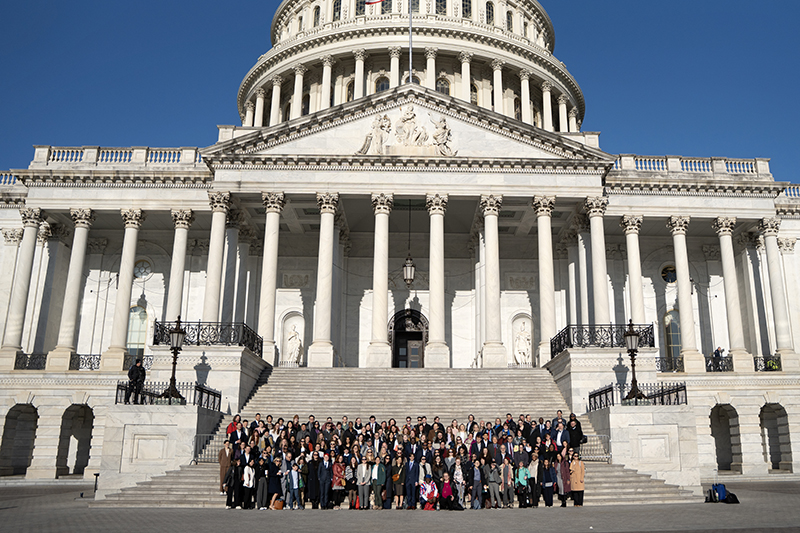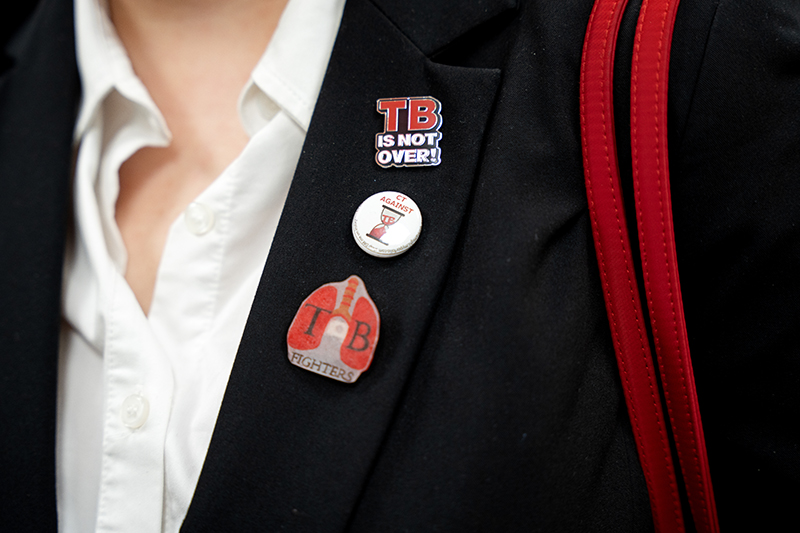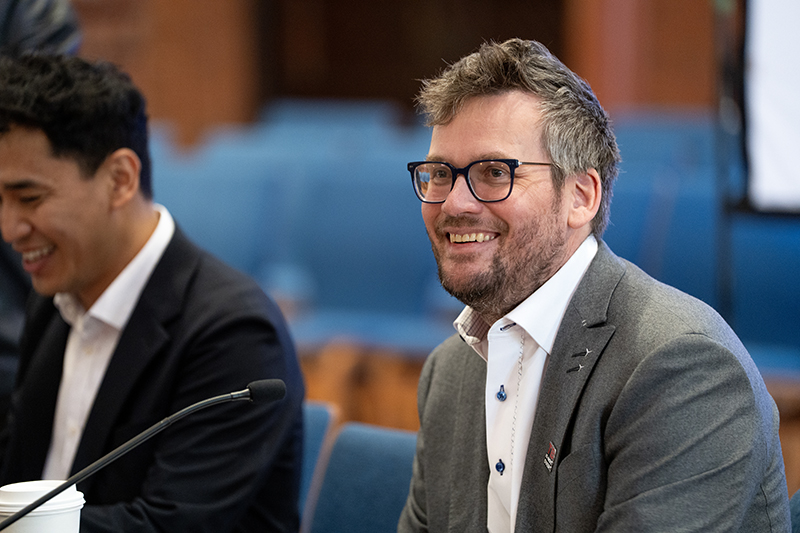TB Hill Day: Asking Congress to Support the Fight Against the World’s Deadliest Infectious Disease
Partners In Health helped facilitate the largest Tuberculosis (TB) Hill Day to date alongside TB experts, survivors, advocates—and bestselling author John Green.
Posted on May 7, 2025

On April 9th, a coalition of over 200 tuberculosis (TB) advocates, experts, and survivors gathered in front of the U.S. Capitol, donning matching “TB ISN’T OVER” lapel pins and representing nearly all 50 states. As the group prepared for the largest TB Hill Day to date, the atmosphere buzzed with conversations ranging from meeting logistics to swapping TB-themed friendship bracelets.
Organized by Partners In Health (PIH), We Are TB, the TB Roundtable, and TBFighters, this annual advocacy day brought the fight against TB—and its ongoing toll—directly to Congress. Participants were scheduled to attend 210 Congressional meetings—94 with Senate offices and 116 in the House—a sixfold increase from the 35 meetings held at last year’s event.

Critically, this year’s Hill Day saw a major surge in grassroots support thanks to PIH Trustee and bestselling author John Green, who has used his platform to spotlight TB as a solvable global health injustice. His call to action rallied members of his online community, Nerdfighteria—a subset of whom, in 2023, followed Green’s growing focus on TB and formed a grassroots network of activists known as the TBFighters.
Despite being completely preventable, treatable, and curable, TB remains the leading infectious disease killer worldwide.
The U.S. government has historically been one of the largest single funders of TB care and prevention worldwide, providing 42% of all international health funding. With its vast federal budget and global influence, Congress has the power to allocate funds that could significantly curb the spread of TB around the world.
“I'm often thinking about how systems have failed people over and over again. This is a fight we can win, and we've just decided that it's not worth winning,” said Kate O'Brien, a TB survivor and advocate from New Jersey who works with We Are TB. “I 500% believe that we can eradicate this disease. I truly, truly believe we can eliminate this disease. All it needs is resources. And I think that our job is to point that out constantly.”
Jessica Dirks has been a Nerdfighter for well over ten years and a TBFighter since the beginning in July 2023. Within TBFighters, she is a community organizer and the lead social media manager. Dirks played a key role in coordinating the group’s presence at TB Hill Day.
“Like most TBFighters, I learned about TB through John Green’s fascination with the issue,” Dirks shared. “When Vincent Lin brought the idea of supporting an existing TB Hill Day to TBFighters, we thought a few people might be interested. As usual, the community blew our expectations out of the water with over one hundred TBFighters traveling to D.C., most on their own dime.”

Throughout the day, TBFighters—often accompanied by PIH staff, TB survivors, or TB experts—met with their congressional representatives to call for urgent, increased federal investment in TB prevention and care.
The requests included:
- Restoring USAID staff and increasing funding for global health TB programs
- Support $1 billion in Fiscal Year 2026 for global bilateral TB efforts.
- Require additional and more frequent reporting that demonstrates appropriated funds are being spent as intended.
- Supporting a contribution of $2 billion to the Global Fund to Fight AIDS, TB and Malaria
- This would help mobilize up to $4 billion from other donors during this replenishment year.
- Protecting CDC’s Division of TB Elimination
- Support $225 million in FY 2026 for the CDC’s Division of TB Elimination.
- Support $21 million in FY 2026 for the CDC’s Division of Global TB.
- Sustaining at least $7.29 billion for the National Institute of Allergy and Infectious Diseases (NIAID)
- Protect the structure of NIAID and its support for TB research.
While these million- and billion-dollar requests may seem large, they are modest within the context of the federal budget. In 2024, the U.S. budget totaled nearly $7 trillion—yet only around $400 million was spent globally on TB research. To put it into perspective: Americans spend roughly seven times more on pet food annually than is spent globally on TB.
With global investments of $20 billion dedicated to TB annually, we could reduce mortality by 90%.
“TB has been curable and preventable for 80 years,” said Dr. Carole Mitnick, professor of global health and social medicine at Harvard Medical School and PIH researcher. “It’s really a matter of how we choose to allocate resources that results in TB’s persistence.”
Following Hill Day, participants began contacting congressional offices to encourage lawmakers to sign on to “Dear Colleague Letters”—memos circulated by members of Congress to build support for specific funding requests. In 2024, the TB Hill Day letters earned signatures from 26 Senators and 131 Representatives. This type of collective citizen advocacy has helped increase bilateral TB funding from $94 million in FY 2006 to $406 million in FY 2024.
“I've been coming to this Hill Day with We Are TB since 2016, and it's been incredible. Every year, I leave feeling so recharged,” O’Brien shared. “But this year, having the involvement of the TBFighters, of Partners In Health, of John Green, and just this huge grassroots movement around TB... It's just been so incredible. I have, in my deepest heart, wished for a moment like this.”

Feedback from the hundreds of meetings held during Hill Day was overwhelmingly positive. Participants reported feeling hopeful, listened to, and part of a united push for justice throughout the event. Several noted the kindness of the Congressional staffers and the overall accessibility of the process.
“The takeaway I heard from so many people is: ‘this wasn’t as hard as I thought,’” Dirks said. “It seems so scary to schedule a meeting and talk with someone at a time when anything vaguely political feels so combative, but the people we met with—mostly aides—were just people.”
Amid rising threats to foreign aid funding, the day served as a powerful reminder of what’s possible when communities organize and raise their voices.
“In this dark moment, an event like this Hill Day gives me hope,” Mitnick shared. “Seeing the generosity of people coming from every single state in the union to be here, to exercise their rights as constituents, and to demand that they be heard by their members of Congress, and to do it with respect and with compassion.”
As the work continues, participants view this year’s Hill Day as one part of a larger movement for global health equity, especially when it comes to TB.
“I’m deeply grateful to be partnering with groups who have been in this fight for so long because now is the time to build a foundation for these efforts. We can all do more together,” Dirks expressed. “There is still so much work to do, but I do think we can end TB, and we’re in this for the long haul.”

